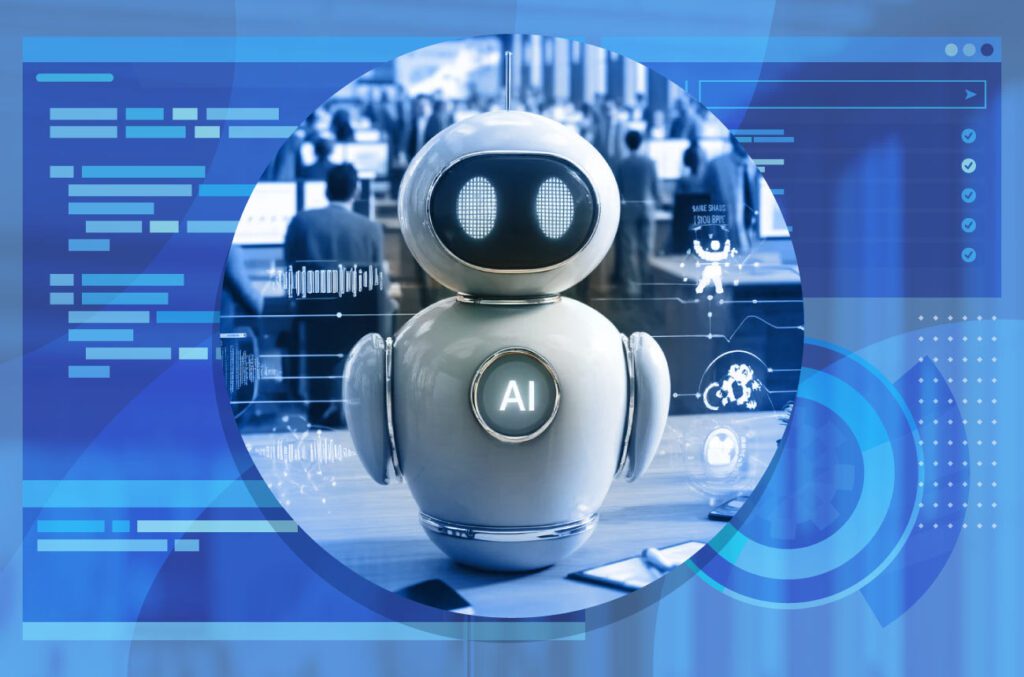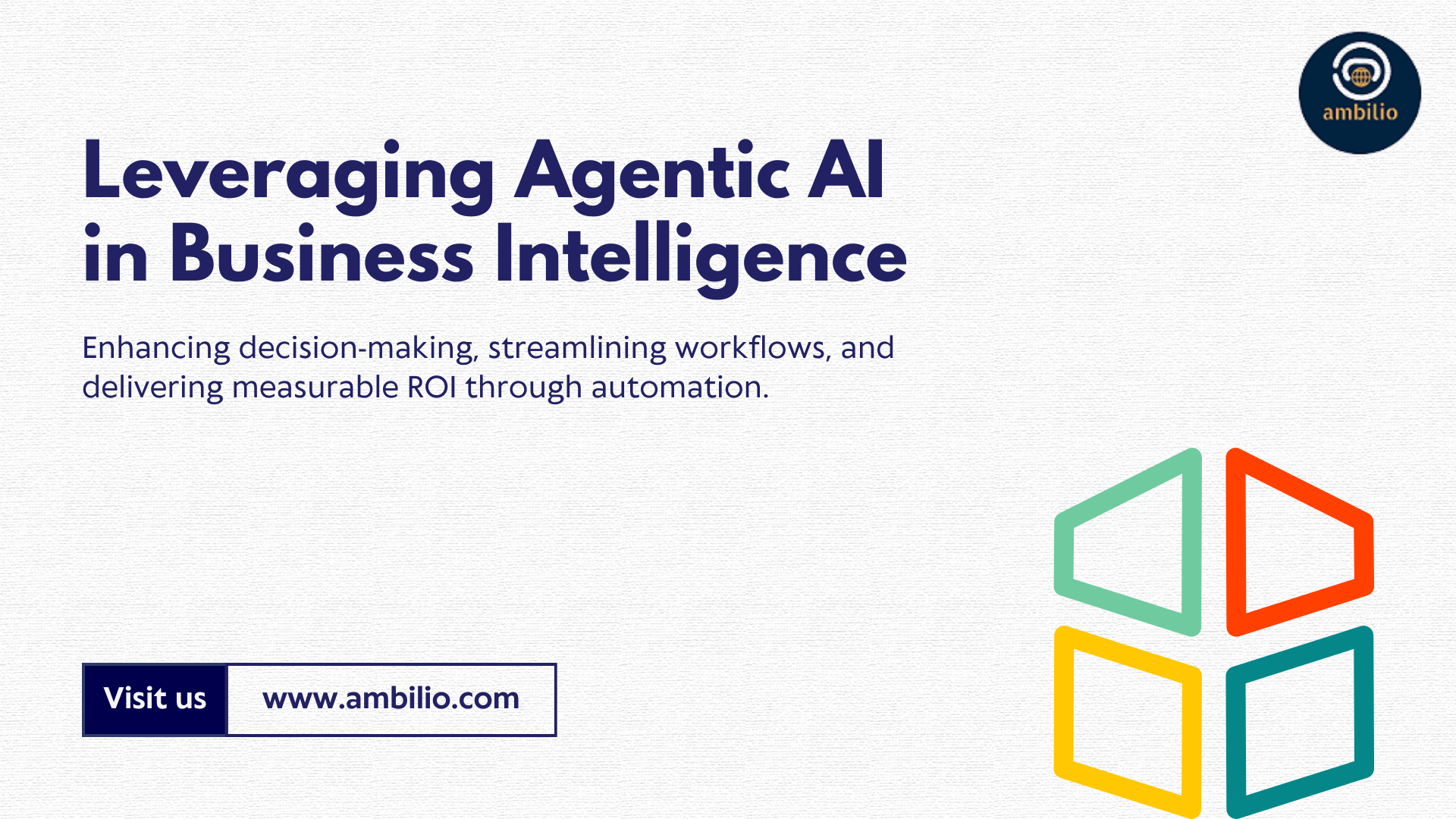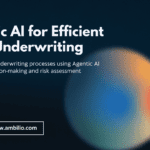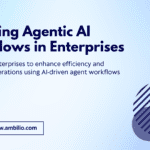The emergence of Agentic AI in business intelligence is redefining how companies process, analyze, and act on vast amounts of data. By introducing autonomous systems capable of complex decision-making and adaptive learning, agentic AI can address many long-standing challenges in business intelligence (BI), including data overload, siloed information, and the limitations of traditional data analytics tools. This article explores how agentic AI is reshaping the business intelligence landscape, the benefits it offers, the challenges it addresses, and how businesses can see a tangible return on investment (ROI) from its adoption.

What is Agentic AI?
Agentic AI refers to artificial intelligence systems that operate autonomously, make decisions, and complete tasks without direct human oversight. These systems are goal-oriented, adapting to changing environments and challenges in real-time, with minimal human intervention. Unlike traditional AI models that are primarily reactive, agentic AI systems proactively manage tasks, analyze data, and generate actionable insights, making them a powerful tool for business intelligence.
Challenges in Business Intelligence Addressed by Agentic AI
Despite significant advancements in business intelligence tools, many challenges persist that prevent businesses from fully unlocking the value of their data. Some of the key challenges include:
1. Data Overload and Complexity
One of the biggest hurdles in business intelligence is the overwhelming volume of data businesses generate. Sorting, cleaning, and analyzing this data manually or even with traditional tools can be slow and inefficient, leading to missed opportunities or delayed decision-making.
Agentic AI in business intelligence can autonomously sift through large datasets, finding patterns and insights that human analysts might overlook due to the sheer volume or complexity of the data. These AI systems can continually update their understanding of the data as it evolves, enabling real-time analysis and decision-making.
2. Siloed Information and Lack of Integration
Many organizations struggle with siloed data that resides in various departments or systems, making it difficult to obtain a unified view of the organization’s performance. Traditional BI tools often require extensive manual work to combine and cross-reference data from different sources.
Agentic AI excels at integrating disparate datasets, autonomously breaking down data silos by synthesizing information from various sources and systems. It can continuously monitor multiple streams of data, providing a comprehensive and unified analysis without manual intervention.
3. Inability to Make Real-Time Decisions
In today’s fast-paced business environment, timely decision-making is critical. However, traditional BI systems often rely on retrospective data analysis, making it hard to respond to real-time changes in the market or business environment.
Agentic AI is built to operate in dynamic environments, enabling businesses to make proactive decisions in real-time. Whether monitoring market trends, customer behavior, or internal processes, agentic AI can react instantly, allowing businesses to pivot their strategies or operations as needed.
4. Limited Predictive Capabilities
While traditional BI tools excel at reporting historical data, their predictive capabilities often fall short, requiring human expertise to make forecasts based on past trends.
Agentic AI can enhance predictive analytics by continuously learning from historical and real-time data, enabling more accurate and actionable forecasting. These AI systems can autonomously predict trends, identify risks, and even recommend actions based on their analysis.
Benefits of Agentic AI in Business Intelligence
Implementing Agentic AI in business intelligence offers a multitude of benefits that help organizations optimize their operations, improve decision-making, and stay ahead of the competition.
1. Autonomous Decision-Making
Agentic AI systems operate without the need for constant human oversight. This enables businesses to automate decision-making processes, reducing the time it takes to act on insights. Whether optimizing supply chains, managing inventory, or adjusting marketing campaigns, agentic AI can handle tasks autonomously.
2. Real-Time Data Analysis and Insights
Agentic AI continuously processes real-time data from multiple sources, ensuring that decision-makers have access to the most current and relevant information. This is particularly valuable in industries like retail, finance, and logistics, where conditions can change rapidly, and decisions need to be made quickly.
3. Enhanced Workflow Efficiency
By automating routine data processing tasks like data cleaning, integration, and visualization, agentic AI allows human analysts to focus on higher-level strategic thinking. This not only improves the efficiency of business intelligence workflows but also allows teams to be more agile and responsive.
4. Improved Accuracy and Precision
Human error in data analysis can lead to costly mistakes. Agentic AI systems mitigate this risk by autonomously analyzing data, identifying patterns, and providing more accurate recommendations based on data-driven insights.
5. Scalability
Agentic AI can scale effortlessly with the size of the dataset and the complexity of tasks. As businesses grow and data volume increases, the AI can handle larger workloads without the need for significant human intervention or additional resources.
Return on Investment (ROI) from Agentic AI in Business Intelligence
Investing in Agentic AI in business intelligence yields measurable ROI in several areas. Below are quantifiable benefits businesses can expect from adopting these advanced AI systems.
1. Cost Savings through Automation
Automating data analysis and decision-making processes can reduce the need for large data science and analytics teams. Companies can reallocate human resources to more strategic functions, resulting in labor cost savings. Businesses implementing agentic AI systems can typically reduce operational costs related to data analysis by 20-30%.
2. Increased Revenue through Better Decision-Making
Agentic AI’s ability to make real-time decisions and predict future trends allows businesses to optimize pricing strategies, improve inventory management, and capitalize on market opportunities. Case studies have shown that companies adopting agentic AI for BI saw revenue increases of 10-15% by making more informed and timely decisions.
3. Faster Time-to-Insight
The time saved by automating data analysis can lead to faster time-to-insight, which translates to quicker decision-making. Businesses can reduce the time needed to analyze large datasets by up to 50%, giving them a competitive edge in responding to market changes.
4. Improved Customer Retention
By using agentic AI to analyze customer feedback, behavior, and preferences, businesses can tailor their offerings to meet customer demands more effectively. Studies show that personalized customer experiences driven by AI can boost customer retention rates by 5-10%, directly impacting revenue growth.
5. Risk Reduction
Agentic AI can continuously monitor risk factors, from market volatility to operational inefficiencies, providing early warnings and recommending preventive measures. By proactively managing risks, businesses can reduce potential losses, with risk management efficiency improvements of 15-20%.
Final Words
The application of Agentic AI in business intelligence is revolutionizing how businesses operate, from automating data analysis to enhancing real-time decision-making. By addressing key challenges such as data overload, siloed information, and slow response times, agentic AI offers businesses a powerful tool to streamline operations and increase profitability.
As businesses increasingly recognize the value of agentic AI, those that invest in this technology will see a significant return on investment through cost savings, increased revenue, and improved decision-making capabilities. The future of business intelligence lies in harnessing the power of agentic AI to drive growth and competitive advantage.



